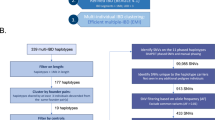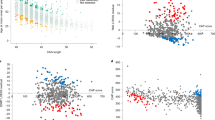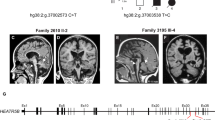Abstract
Huntington's disease (HD) is an autosomal dominant neurodegenerative disorder characterized by progressive involuntary movements and dementia1,2. The symptoms of the disease, although devastating in severity, do not usually appear until the third to fourth decade of life. The gene defect is highly penetrant, and results in the loss of neurones in the basal ganglia, globus pallidus, and more diffusely in the cortex. A DNA marker, G8 (or D4S10), is tightly linked to Huntington's disease and this gene has been localized to chromosome 4 (ref. 3). The discovery of this linkage marker raises the possibility of developing a presymptomatic test for the disorder, and of eventually isolating the disease gene based on its map position4. We have now regionally localized the DNA marker G8 to the terminal band of the short arm of the chromosome, a region representing approximately 0.5% of the total human genome. The assignment was made by examining DNA from patients with Wolf–Hirschhorn syndrome, a birth defect resulting from partial heterozygous deletion of the short arm Of chromosome 4.
This is a preview of subscription content, access via your institution
Access options
Subscribe to this journal
Receive 51 print issues and online access
$199.00 per year
only $3.90 per issue
Buy this article
- Purchase on Springer Link
- Instant access to full article PDF
Prices may be subject to local taxes which are calculated during checkout
Similar content being viewed by others
References
Huntington, G. Med. Surg. Reporter 26, 317–321 (1872).
Hayden, M. R. Huntington's Chorea (Springer, New York, 1981).
Gusella, J. F. et al. Nature 306, 234–238 (1982).
Gusella, J. F. et al. Science 225, 1230–1326 (1984).
Wolf, U. et al. Humangenetik 1, 397–413 (1965).
Hirschhorn, K., Cooper, H. L. & Firschein, I. L. Humangenetik 1, 470–482 (1965).
Wilson, M. G. et al. Hum. Genet. 59, 297–307 (1981).
NIGMS Human Genetic Mutant Cell Repository, 1984 Catalog of Cell Lines (NIH publication 84–2011).
Hannig, V., Schroer, R. J., Martens, P. & Phalen, M. C. Proc. Greenwood Gen. Cent. 3, 19–21 (1984).
Gusella, J. F. et al. Am. J. hum. Genet. 36, 139S (1984).
Murray, J. C. et al. Proc. natn. Acad. Sci. U.S.A. 80, 5951–5955 (1983).
Gusella, J. F. in Genetic Engineering Vol. 7 (eds Setlow; J. K. & Hollaender, A.) (Plenum, New York, in the press).
Kurnit, D. M., Wallner Philipp, B. & Bruns, G. A. P. Cytogenet. Cell Genet. 34, 282–288 (1982).
Folstein, S. E. et al. Science (in the press).
Wexler, N. S. et al. Archs Neurol. 42, 20–24 (1985).
Murray, J. C. et al. Proc. natn. Acad. So. U.S.A. 81, 3486–3490 (1984).
Harper, M. E. & Dugaiczyk, A. Am. J. hum. Genet. 35, 565–572 (1983).
Author information
Authors and Affiliations
Rights and permissions
About this article
Cite this article
Gusella, J., Tanzi, R., Bader, P. et al. Deletion of Huntington's disease-linked G8 (D4S10) locus in Wolf–Hirschhorn syndrome. Nature 318, 75–78 (1985). https://doi.org/10.1038/318075a0
Received:
Accepted:
Published:
Issue Date:
DOI: https://doi.org/10.1038/318075a0
This article is cited by
-
Protective Effects of Antioxidants in Huntington’s Disease: an Extensive Review
Neurotoxicity Research (2019)
-
Huntingtin gene repeat size variations affect risk of lifetime depression
Translational Psychiatry (2017)
-
Expression analysis of the ataxin–1 protein in tissues from normal and spinocerebellar ataxia type 1 individuals
Nature Genetics (1995)
-
Toward the complete genomic map and molecular pathology of human chromosome 4
Human Genetics (1994)
-
A linkage study with DNA markers (D4S95, D4S115, and D4S111) in Japanese Huntington disease families
Japanese journal of human genetics (1993)
Comments
By submitting a comment you agree to abide by our Terms and Community Guidelines. If you find something abusive or that does not comply with our terms or guidelines please flag it as inappropriate.



